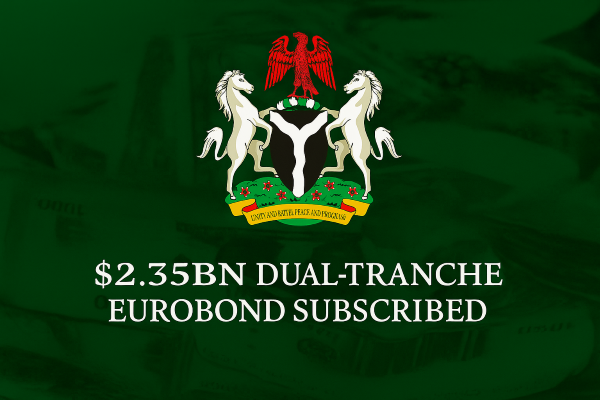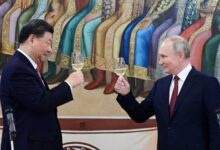Nigeria Reaffirms Global Market Credibility with $2.35bn Dual-Tranche Eurobond

Nigeria has achieved another milestone in international finance with the successful pricing of a $2.35 billion Eurobond, marking a strong vote of confidence in its economic reforms and policy direction.
The bond offering — split into $1.25 billion (2036 maturity) and $1.10 billion (2046 maturity) — was issued at 8.63% and 9.13% yields respectively, confirming renewed investor appetite for Nigeria’s long-term sovereign debt.
According to the Debt Management Office (DMO), the issuance attracted an unprecedented order book of over $13 billion, the largest in Nigeria’s Eurobond history.
The robust subscription, coming from global investors across the UK, North America, Europe, Asia, the Middle East, and even Nigeria, signals a resurgence of confidence in Africa’s largest economy and its reform-driven growth outlook.
“This is a major vote of confidence in Nigeria’s economic policies, prudent fiscal management, and reform trajectory,” the DMO stated. “It underscores our strong market access and global credibility.”
A Record Orderbook Reflects Renewed Global Trust
The Nigeria Eurobond issuance represents Nigeria’s largest-ever investor book, demonstrating that despite inflationary headwinds, the global market continues to view Nigeria as a strategically attractive credit.
Investor demand came from a diverse mix of institutions — fund managers, insurance and pension funds, hedge funds, and global banks — underscoring broad-based support for Nigeria’s medium- to long-term debt strategy.
The pricing of 8.63% for the 2036 note and 9.13% for the 2046 note aligns with global benchmarks for emerging market sovereigns while balancing Nigeria’s need for competitive long-term financing.
“This successful Eurobond pricing underscores investors’ recognition of Nigeria’s credible macroeconomic reforms and fiscal consolidation efforts,” said Minister of Finance and Coordinating Minister of the Economy, Wale Edun. “It demonstrates confidence in our commitment to sustainable and inclusive growth.”
Strategic Debt Management and Reform Synergy
The Debt Management Office emphasized that the Eurobond proceeds would be deployed to finance the 2025 fiscal deficit, as well as fund other key infrastructure and development priorities under President Bola Tinubu’s Renewed Hope Agenda.
Patience Oniha, the DMO Director-General, noted that the Nigeria Eurobond aligns with Nigeria’s broader strategy to diversify funding sources, access long-term capital, and deepen the domestic financial ecosystem.
“The ability to access international markets underlines investor belief in Nigeria’s economic prospects,” Oniha said. “These funds will support infrastructure development and fiscal sustainability objectives.”
The Eurobonds will be listed on the London Stock Exchange, the FMDQ Securities Exchange Limited, and the Nigerian Exchange Limited (NGX) — reinforcing Nigeria’s integration into global and local capital markets.
The deal was arranged by leading international bookrunners Chapel Hill Denham, Citigroup, Goldman Sachs, J.P. Morgan, and Standard Chartered Bank, with FSDH Merchant Bank Limited acting as financial adviser.
BRANDECONOMY ANALYSIS: The Repricing of Nigeria’s Global Credit Story
Nigeria’s return to the Eurobond market at a time of tight global liquidity and elevated U.S. yields sends a clear message: international investors are once again pricing in reform optimism rather than risk aversion.
BRANDECONOMY’s expert review highlights four critical implications of this Nigeria Eurobond issuance for Nigeria’s financial and capital markets ecosystem:
1. Market Revalidation of Nigeria’s Creditworthiness
The record-breaking subscription of $13 billion reinforces that global markets are willing to back Nigeria’s reform path — including foreign exchange unification, subsidy removal, and fiscal discipline — which investors see as foundational for long-term stability.
2. Strategic Timing amid Global Tightening
The issuance demonstrates tactical agility. With global investors seeking yield diversification beyond U.S. Treasuries, Nigeria has positioned itself as a frontline emerging market play offering both yield and reform momentum.
3. Boost for Local and Regional Capital Markets
Listing the Eurobonds on both international and domestic exchanges will deepen Nigeria’s secondary market liquidity, attract diaspora and institutional investors, and enhance the visibility of Nigeria’s debt instruments.
4. Fiscal Breathing Space for Structural Investments
By raising long-term foreign capital, Nigeria can manage short-term fiscal pressures while redirecting local liquidity toward private sector credit expansion — a key enabler for domestic growth.
Investor Confidence and the Path Forward
President Bola Tinubu described the successful bond pricing as “a reaffirmation of Nigeria’s credibility and a resounding vote of confidence in the nation’s reform agenda.”
Indeed, this success comes as Nigeria intensifies efforts to:
- Expand its tax-to-GDP ratio,
- Reduce debt service-to-revenue ratios, and
- Reposition the naira for market stability.
Nigeria’s ability to command record investor attention amid a globally competitive market confirms its standing as a leading frontier for fixed-income investors in Africa.
“Nigeria is reasserting itself as a credible participant in the global capital market,” the President said. “This is evidence that the world believes in our economic direction.”
OUTLOOK: Confidence Meets Credibility
The success of Nigeria’s $2.35bn Eurobond issuance should not be viewed merely as a debt transaction — it is a strategic signal of renewed confidence, fiscal credibility, and the early returns of reform-driven governance.
However, sustaining this momentum requires consistent policy execution, exchange rate stabilization, and continued fiscal transparency.
If these remain intact, Nigeria’s Eurobond yield curve could tighten in the medium term, further reducing borrowing costs for both the government and corporates.
The road to macroeconomic recovery is long, but this issuance proves that global investors are willing to walk it with Nigeria — as long as reforms stay on track.











